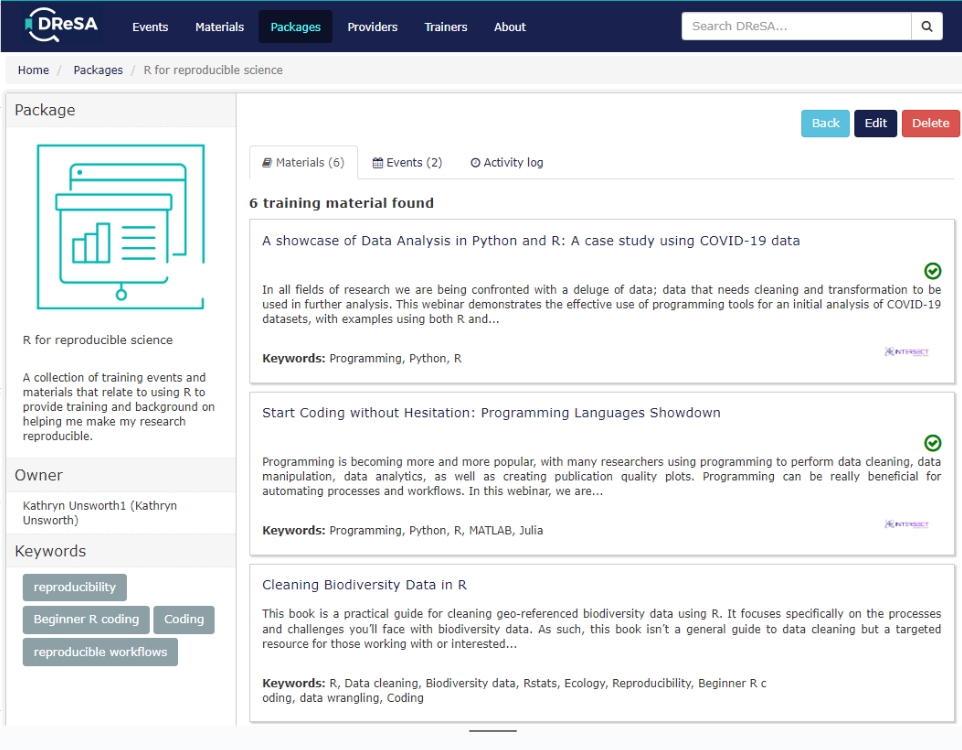
- Search queries: DReSA stores your search terms but not your IP address or any other personally identifiable information (PII). This data is used to improve the search functionality and understand user needs.
- Starred resources: DReSA collects summary cards for the resources that the user has ‘starred’, but your name or other identifiers are not attached to it.
- Subscription information: If you subscribe to email alerts, DReSA stores your email address to send you relevant notifications. You can unsubscribe at any time.
- To improve DReSA: The data is primarily used for internal purposes to improve the platform's functionality, discoverability, and content selection. The DReSA team may analyse search trends and user behaviour to understand what topics are most in demand and tailor services accordingly.
- For anonymised reporting: The DReSA team may create anonymised reports based on user data for stakeholders or funding agencies, but these reports do not contain any individual’s information.
“Hello name, A request has been made to change your password on DReSA. You can reset your password using the link below: [a link will be provided] If you did not request this change, please disregard this email. Your password will remain unchanged until you use the link above to create a new one.”
If password issues arise that cannot be resolved through the above actions, please send your query to contact@dresa.org.au.
There are a number of ways to add training events and materials after registering as a user and creating a free account.
1. Manual Submission:
Training providers and trainers can submit their training events and materials information directly through an online form on the DReSA website. This method offers flexibility and caters to providers who only have a small number of events and materials to share on DReSA and where automated options may not be straightforward. For information on Creating and Maintaining Events and Materials refer to the DReSA User Manual.
2. API Integration:
DReSA offers an Application Programming Interface (API) that allows providers to directly connect their training databases and automatically feed event information into the DReSA platform. This ensures real-time updates and reduces manual effort for both parties. Please email contact@dresa.org.au for help with setting this up.
3. Data Harvesting:
DReSA can harvest event data from publicly available websites and calendars of partner organisations. This helps capture additional events that might not be submitted manually. If you would like to see if we can harvest your public training material email contact@dresa.org.au.
4. CSV upload
- A separate file is required for each type of resource that is being ingested in csv format. The information required to set up the ingestion are the URL of each file and the name of the provider to which they should be linked.
- There is a specific approach to formatting the CSV, which is shown in the following two Google sheets:
- When saving your events or training materials metadata spreadsheet to csv, ensure that the encoding is using UTF-8 and not UTF-8 BOM.
- If using Google sheets or uploading a CSV into Google sheets the file will automatically be converted to UTF-8 upon opening it.
- If using Excel, click "File" → "Save as". Name your file, select CSV file type, and click "Tools" → "Web Options". Go to the Encoding tab. In the dropdown for Save this document as: choose Unicode (UTF-8) and click "OK". Note: sometimes the default encoding format is already set to UTF-8 at the point of selecting the CSV file type.
- Training in DReSA can be discovered:
- By browsing DReSA or subscribing to notifications.
- In search engine results, using data harvested from DReSA.
- Through other websites that display DReSA content or sourced using our public API.
- Wider Variety of Training: DReSA aggregates training opportunities from various providers, offering a broader range of topics and formats compared to what your university might offer. This allows researchers, HDRs, PhD candidates and students to explore new skills and tools beyond their immediate departmental or institutional offerings.
- Advanced Topics and Expertise: DReSA connects users with trainers and providers from diverse backgrounds and institutions. This can bring access to specialists and advanced skills training not readily available within your university.
- Flexibility and Convenience: Training events on DReSA are offered by Providers in a variety of modes (online, in person) or in different locations, giving your researchers, HDRs, PhD candidates and students flexibility in attending based on their schedule and preferences.
- Complementary Training: DReSA can supplement your existing training programs by offering additional or specialised options from other Providers, which helps to reduce duplication of effort.
- Cost-Effectiveness: Utilising existing resources catalogued on DReSA can reduce the need for your university to develop and offer all training in-house, potentially saving staff time and budget resources.
- Expertise Identification: DReSA can help you identify external trainers and experts for specific training needs for your university.
- Benchmarking and Trends: By exploring training offerings on DReSA, you can gain insights into broader trends and best practices in digital research skills development, aiding in improving your own programs.
- You can use DReSA's filtering options to target specific training opportunities relevant to the needs of your researchers, HDRs, PhD candidates and students based on their discipline, skill level, and preferred format.